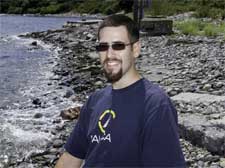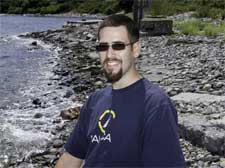 Snug Harbor resident investigating bay’s water quality
Snug Harbor resident investigating bay’s water quality
KINGSTON, R.I. – August 20, 2008 — University of Rhode Island senior Nick Larghi is spending his summer on the water. But as a Coastal Fellow at URI’s Graduate School of Oceanography, he is more interested in what’s below the surface.
In collaboration with graduate student Emily Shumchenia, Larghi is collecting data on the oxygen levels in Greenwich Bay and comparing them with images of the sediments in the area.
Bays that have low levels of oxygen — less than 2-3 milligrams per liter of seawater — are considered hypoxic. While it is sometimes a natural occurrence, hypoxia is often caused by human factors like roadway run-off, sewage overflows, and other nutrient pollution. These hypoxic events can have adverse effects on the marine environment, like occurred when thousands of fish and shellfish died in Greenwich Bay in 2003.
Larghi and his fellow researchers are using a sediment profiling imager to evaluate the habitat below the surface.
The enormous structure that houses the camera requires a forklift to move it, but Larghi explained that once the imager is set in place and sinks into the sediment, it “pretty much works just like a regular camera.”
For his research, Larghi is comparing the sediment images with the water quality data for specific habitats, and assessing the correlations.
His hypothesis is that the images will accurately reflect the water quality status in Greenwich Bay, but with the understanding that “nobody really knows how long it takes for a marine community to react to hypoxia.”
Larghi’s research was undertaken as a part of the URI Coastal Fellows program, a unique initiative designed to involve undergraduate students in addressing current environmental problems. Now in its 14th year, the program based in URI’s College of the Environment and Life Sciences team students with faculty, research staff and graduate students to help them gain skills that will ensure their future success.
The marine biology major chose to do his fellowship for the hands-on experience it provided. “There is a lot of opportunity to learn new things,” said the Snug Harbor resident. “Learning how to use the camera, a computer mapping program, sidescan sonar, as well as studying a new field, geology.”
The Graduate School of Oceanography was also flexible in allowing Larghi to start his research after he returned from Costa Rica in late June. He was one of a team of students and faculty that spent several weeks studying small mammals on a coffee farm to determine whether shade-grown coffee is as environmentally friendly as some have claimed it to be.
“At URI, I’ve had a lot of opportunities to do research. It’s all about putting yourself out there,” Larghi said.
In addition to his research projects this summer, the URI student worked as a lab assistant last spring and at the Rhode Island Department of Environmental Management two years ago.
Larghi said he likes the variety of research he has undertaken at URI. “The different experiences show you what you do and do not enjoy.”
Unsure of his future plans, Larghi has often thought about becoming a professor so he can continue his passion for research.
URI Department of Communications & Marketing photo by Michael Salerno Photography.

